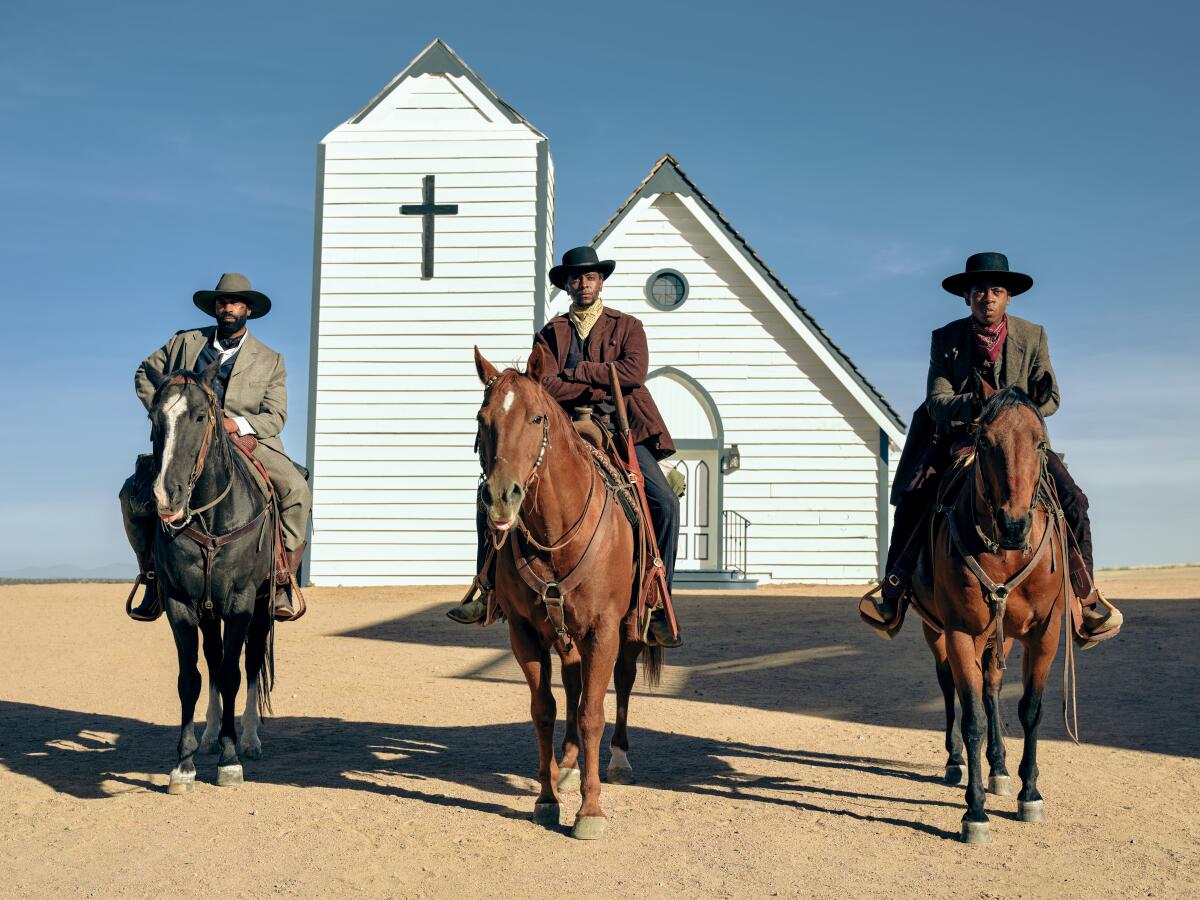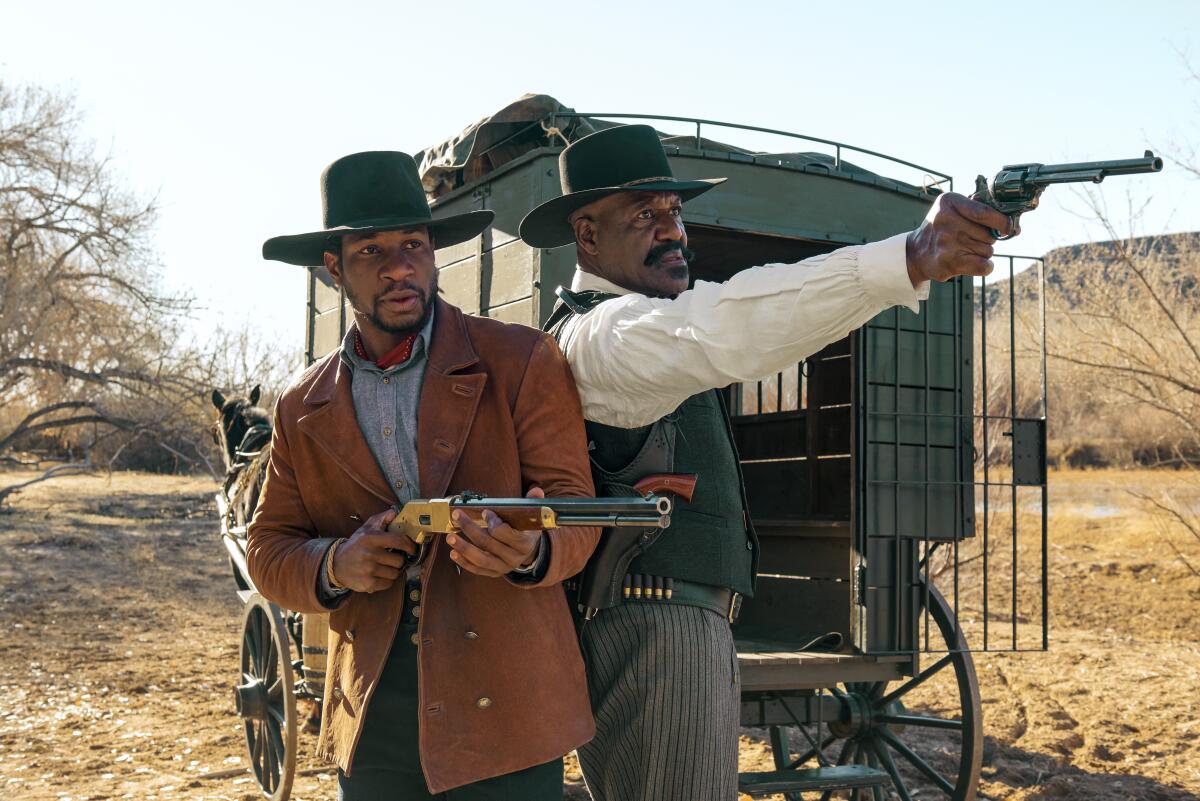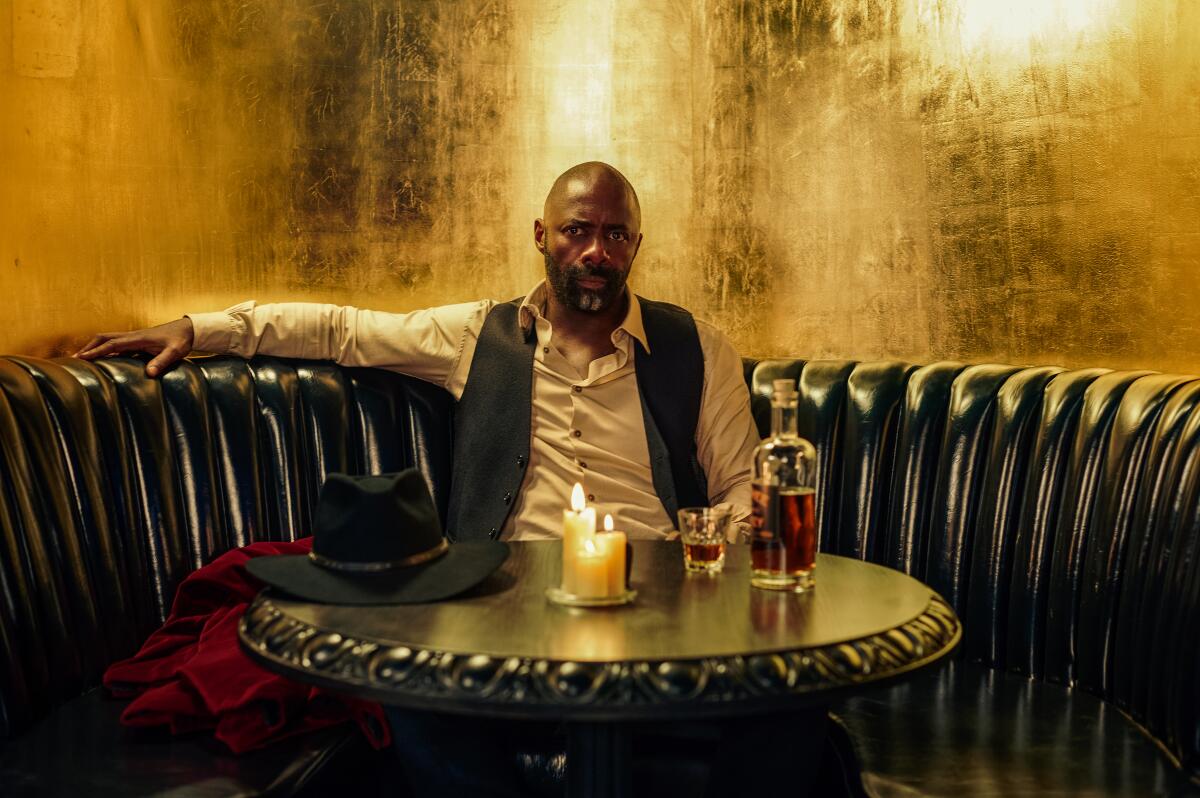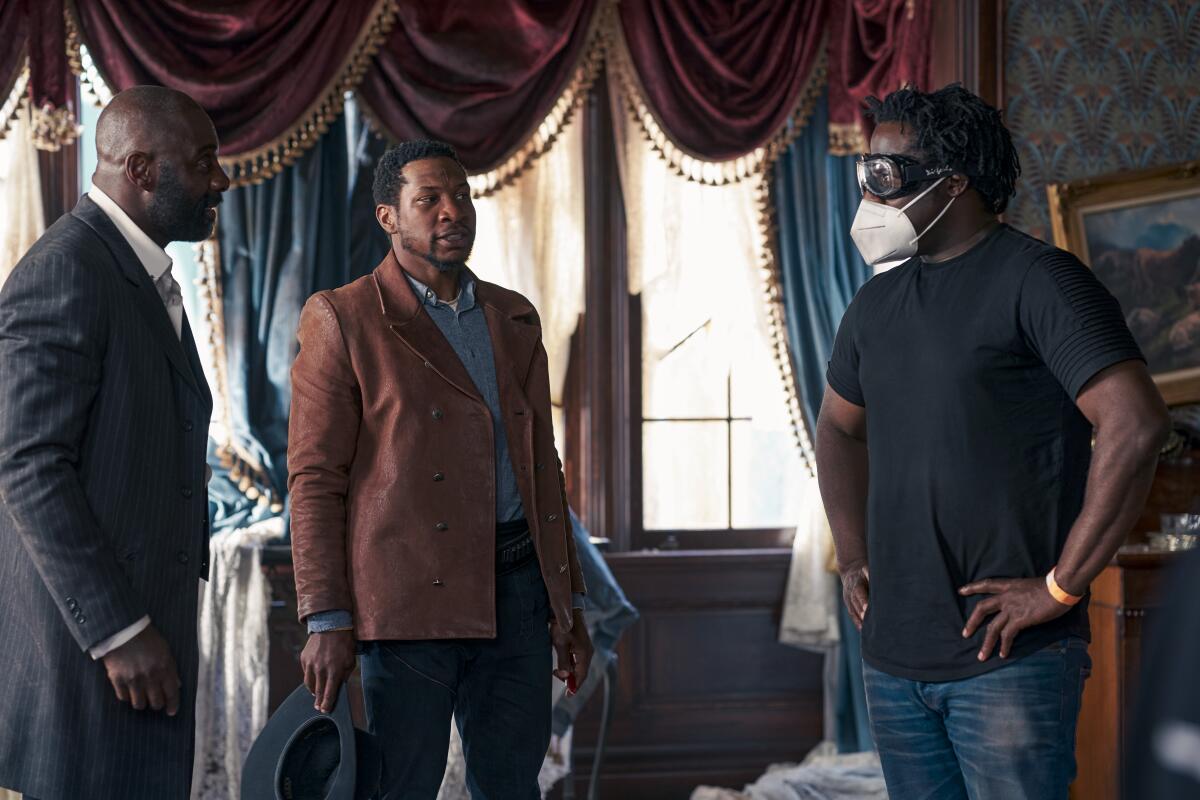How ‘The Harder They Fall’ corrects Hollywood’s historical record of Black cowboys

- Share via
Although Jeymes Samuel’s “The Harder They Fall” is a rare western to feature an all-Black cast (and the first to come from a major Hollywood company since Mario Van Peebles’ 1993 drama “Posse”), that doesn’t mean it should be written off as a “Black western.”
“It’s just a story about these people in their own world, just like ‘Rio Bravo’ is a story about John Wayne and Dean Martin in their own world,” said the director over Zoom. “Like ‘Unforgiven’ is a story about Gene Hackman and Clint Eastwood in their own world. These aren’t white westerns or white movies, they’re just movies.”
Samuel, who makes his feature directorial debut with the Netflix drama that begins streaming Wednesday, spent the last decade putting together “The Harder They Fall,” and is also a producer alongside James Lassiter, Shawn Carter and Lawrence Bender. The film features an ensemble cast including Idris Elba, Jonathan Majors, Regina King, Zazie Beetz and LaKeith Stanfield portraying historical Black figures Rufus Buck, Nat Love, Trudy Smith, Stagecoach Mary and Cherokee Bill, respectively.
“I’ve always been enamored with westerns my whole life,” said Samuel. “But they’re always white-male-centric. Every time they show a woman in westerns, white or Black, they’re subservient to a male figure. And when they show people of color, they’re treated as less than human. So I wanted to broaden the narrative.
“I wanted to bring all these real characters into the fray to once and for all dead the argument that we [didn’t] exist in the Old West,” he added. “Hollywood just whitewashed that whole period, so in order to put it on a huge canvas, I made a fictional story but put all of these real-life characters in it.”
The Times caught up with Samuel to discuss the making of the film, the casting process and his hopes to expand on the universe he’s established in “The Harder They Fall.”

Process
Around the age of 13, having grown up watching westerns, Samuel felt drawn to research the historical environment in which they took place. He became a fixture at London’s Queens Park Library, which housed a wealth of books about the Old West.
“I learned that one out of four cowboys was Black and then I started learning about all of these real-life characters that existed, like Cherokee Bill, Nat Love and Stagecoach Mary,” he said. “As I was learning about all of these people, I wondered why I knew all the words to Doris Day’s ‘Just Blew in From the Windy City’ from ‘Calamity Jane’ but never knew about Stagecoach Mary or Gertrude Smith.”
He started creating his own stories and released the short film “They Die by Dawn” in 2013. That film — which also featured an all-star cast, including Erykah Badu, Giancarlo Esposito, Michael K. Williams, Nate Parker, Rosario Dawson and Isaiah Washington — featured a lot of the same characters that would be included in “The Harder They Fall.”
“We were always there [in the West],” said Samuel. “And there was no period in history where women weren’t as dominant as men. For whatever reason, Hollywood just wiped them out. For me, that’s just bad storytelling.
“There’s something to be said about growing up thinking you’re the offspring of slaves,” he added. “Black people, at no point in history, were slaves. We were enslaved, that’s totally different. So for me, I didn’t really have a choice but to make ‘The Harder They Fall.’ It was a huge undertaking, that’s why it took so damn long, but to have a $90-million movie as your debut takes a while to put together. I just wanted to give that to the culture so we can broaden history.”

Casting
The real-life characters featured in the film existed at different points in time from one another and looked drastically different from their onscreen counterparts. “I needed a vehicle, a fictionalized story, to put all of these characters in,” said Samuel. “So what I did is just draw from what we experience too much of in this country and in England: the cycle of violence.
“I wanted to tell a story where the antagonist and the protagonist are essentially the same person doing the exact same thing. It’s a never-ending loop of violence that we are sucked into and I wanted to not preach but to shine a light or [comment] on what happens all too often in our community.”
Instead of prioritizing historical accuracy, Samuel cast actors who could shoulder the emotional heft of their characters. “I just wanted to cast with regards to the story I’m telling as opposed to making a biopic, which this isn’t,” he said. “I want people to leave the movie knowing that these characters existed and to have [conversations] about these real characters, because it has literally been the torture of my life trying to prove that these people existed. Even in the internet age people would still argue with me, but now the argument is dead.
“I wasn’t looking at who looks like any of those characters, because none of them do. What I was looking at was who would be best served to play the characters in this movie? Rufus Buck was executed at 18 years old. If I’m casting a big, menacing villain with mad presence, man, I want Idris Elba. I don’t want to cast an 18-year-old. And also it doesn’t serve the story.
“The same with Nat Love,” he added. “Jonathan Majors is one of the dopest new actors of our time and he really can dig deep and give you that emotional turmoil and weight that I’m looking for while being the ultimate action hero. I didn’t even use a stuntman for Jonathan Majors, all those stunts he’s doing himself.”
As Samuel was building his ensemble, he also wanted to avoid one of the biggest stereotypes that plague Black dramas set in the past. “As soon as they cast Black people in a period piece in general, they’ll use the N-word like 100,000 times,” he said. “You don’t hear the N-word one time in ‘The Harder They Fall.’ A man is just about to say it when he gets off the train, [then] bang! Then Trudy Smith goes on to say, ‘They say anything even starting with an n, they’re going to meet the same fate.’ I want those words delivered by Regina King, with such power and authority.”

Setbacks
Having to shoot such a big, ambitious movie involving horses and stunts for his debut was “super hard,” said Samuel. But shooting in the midst of the pandemic was the most difficult part.
“They say when you’re shooting a movie, Murphy’s Law happens,” said Samuel. “Anything that can go wrong will go wrong. We were one day before shooting and coronavirus swept the whole world and we got shut down. We had to come back almost six months later to shoot the movie in the most intense restrictions.
“I had to wear goggles, a face mask and a face shield and I couldn’t talk to the actors from less than 6 feet away,” he recalled. “That’s the way I had to make my debut film.
“We do everything with the knowledge that we’re going to be safe. But now you’re constantly having to rally up the cast and crew and inject morale. So I’d have a big speaker by my video village and I’d blast out music. There’d be dance parties on set sometimes, and it was amazing. I’d do that just to remember why we’re doing this. I always say the film we make is for the public but the making of it is for us.”
Sequels?
When asked whether he’d be interested in returning for a sequel, Samuel offered an emphatic yes. “Absolutely,” he said. “I’ll be returning, God willing, for a sequel, a prequel. ... ‘The Harder They Fall’ for me was always a broader story. I’ve kind of introduced a universe of possibilities.
“I end the movie without saying too much because I loved cliffhangers when I was a kid. So I’d love to return and flesh these things out. I’ve already got stories for both.”
More to Read
Only good movies
Get the Indie Focus newsletter, Mark Olsen's weekly guide to the world of cinema.
You may occasionally receive promotional content from the Los Angeles Times.











